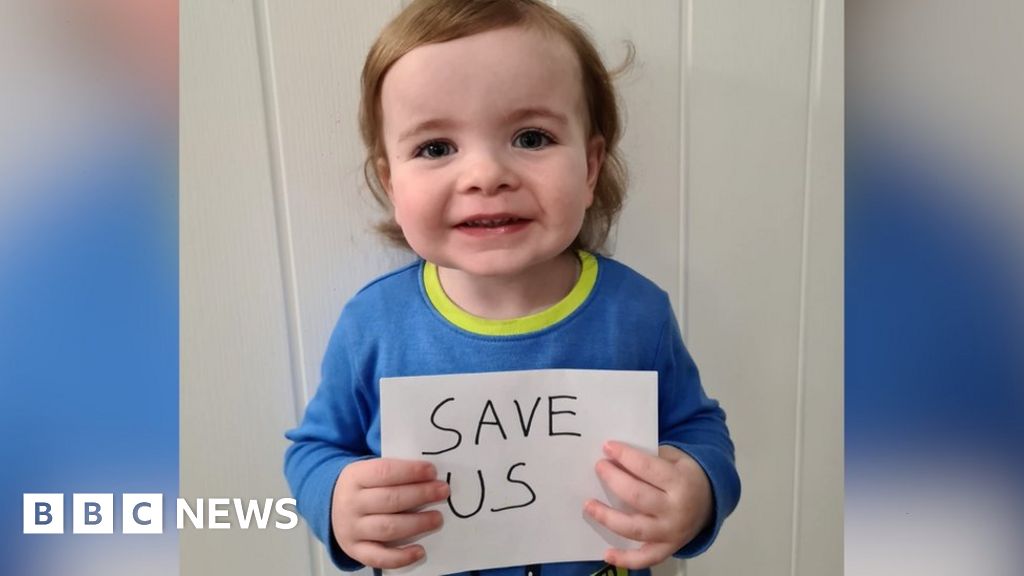- By Catherine Moore
- BBC News NI
Image source, Alice Colvin
George Colvin’s mum Alice believed Kaftrio would make a difference to his condition
Parents of Northern Ireland children with cystic fibrosis (CF) say they are worried by a recommendation to remove access to three drugs to treat it.
Draft guidance from the UK’s healthcare advice body says that Orkambi, Symkevi and Kaftrio are too expensive to be recommended for use on the NHS.
Alice Colvin, whose son George, two, has CF, hoped Kaftrio would help him.
“You think your child is going to get this amazing drug and then it’s snatched away from you,” she said.
“We’ve always heard about this Kaftrio and held on hope. It’s brought us right back to the diagnosis, through those emotions.”
The draft guidance was provided by the National Institute for Health and Care Excellence (Nice), which said it was “evaluating the cost-effectiveness” of the drugs “to ensure that taxpayers continue to get value for money”.
A final decision on the treatments will be made after a four-week consultation.
‘It’s heart-breaking’
Laura McGlone, whose four-year-old son Shea has CF, described the potential change as “gut-wrenching”.
The family went on holiday to Spain this year and were worried Shea would pick up an infection from the swimming pool.
“My husband said: ‘Next year he’ll be on Kaftrio and we can let him in the pool then,'” said Ms McGlone.
“That’s the hope we had to make his life as normal as possible. It’s heart-breaking to tell him: ‘No.'”
What is cystic fibrosis?
Cystic fibrosis is an inherited condition that causes sticky mucus to build up in the lungs and digestive system.
It can cause lung infections and problems with digesting food.
Symptoms usually start in early childhood and vary for each individual but the condition gradually gets worse over time, with the lungs and digestive system becoming increasingly damaged.
There is no cure for the condition but a range of treatments can help control symptoms and reduce complications.
North Antrim MP Ian Paisley raised the issue in the House of Commons on Thursday.
He said that “such a decision robs suffering children and their parents of the hope to life” and he asked if the four-week consultation period was adequate.
Commons Leader Penny Mordaunt acknowledged that the evaluation “will be a concern to everyone who has this condition or their carers and families”.
She said: “There is a very clear process to go through to ensure that drugs that are available and are approved by Nice are cost effective as well as clinically effective”.
Ms Mordaunt added that even if a drug is not Nice-approved “patients under certain circumstances can still have access to it if it can be shown it would disproportionately benefit that individual”.
‘Need to find a solution’
According to Ms Colvin, CF affects George’s bowel, which has made toilet training difficult, but she had hoped Kaftrio would make a difference.
When George gets viruses he has to increase his use of nebulizers, go on antibiotics, steroids or inhalers and increase the amount of physiotherapy he does.
Ms Colvin said the family was more mindful of the “cleanliness of the house” and potential bacteria in “leaves and muddy puddles”.
Ms McGlone said her son Shea was “very well” but they work hard to achieve that through physiotherapy and medication.
“In the winter when it’s colder he has an increase in nebulizer treatment and physio so it’s a rigorous routine,” she said.
Image source, Getty Images
A final decision on the treatments will be reached after a four-week consultation
Cystic Fibrosis Trust chief executive David Ramsden said Nice’s initial recommendation was “disappointing news”.
He emphasised the need “to find a solution to make these treatments available for all those who could potentially benefit”.
“We must never return to a situation where people with CF die far too young, knowing there’s a treatment that could change that,” he added.
Stormont’s Department of Health emphasised that “the draft guidance is not Nice’s final guidance”.
“Comments received during this consultation will be considered by Nice at a further appraisal meeting before the next draft guidance is issued,” it said.
Health service patients were given access to the drugs Orkambi and Symkevi in 2019 and Kaftrio in 2020.
The Nice appraisal process started at the end of 2022, with the draft guidance open for consultation until 24 November.
Nice expects to publish final guidance in mid-March 2024.

Sarah Carter is a health and wellness expert residing in the UK. With a background in healthcare, she offers evidence-based advice on fitness, nutrition, and mental well-being, promoting healthier living for readers.








